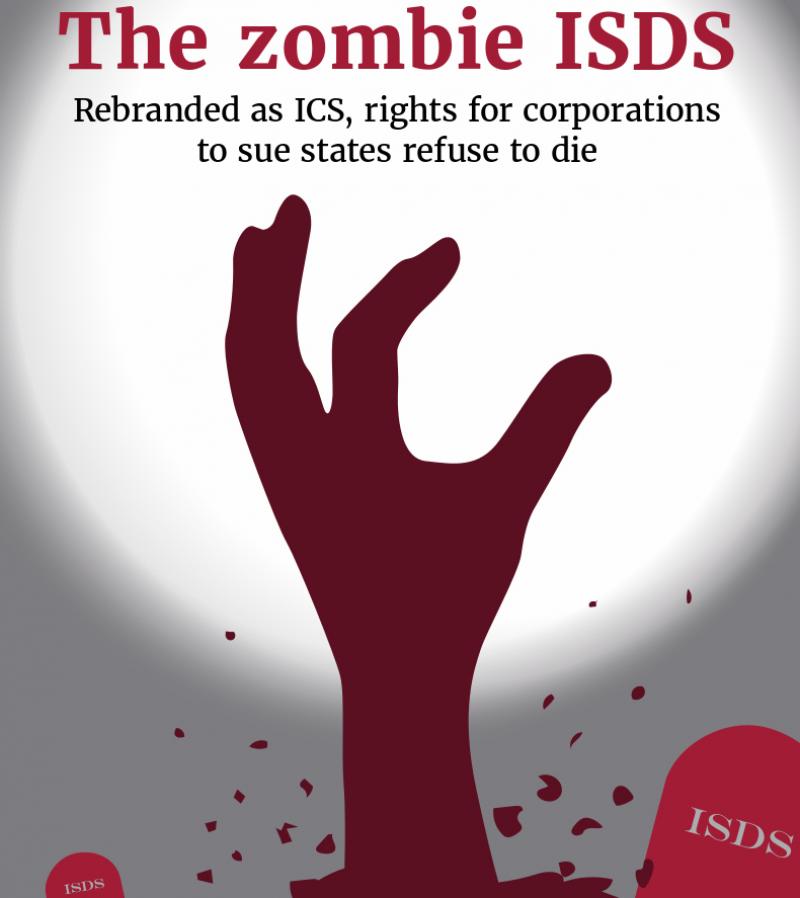
The zombie ISDS
Rebranded as ICS, rights for corporations to sue states refuse to die
“The zombie ISDS – rebranded as ICS, rights for corporations to sue states refuse to die” shows how the push for foreign investor privileges in EU trade talks such as the proposed EU-US TTIP deal continues as the Commission attempts to rebrand the politically untenable investor-state dispute settlement (ISDS) as an “Investment Court System” (ICS). An unprecedented Europe-wide controversy over the democratic threat posed by ISDS led to last autumn’s rebranding of ISDS as ICS in an attempt to get around the enormous public opposition to legal privileges for multinational corporations.
For the past two years, an unprecedented Europe-wide public controversy about a once-unknown element in international trade agreements has kept citizens, politicians and the media on their toes. It’s all been about the so-called investor-state dispute settlement system, in short, ISDS.
ISDS is included in thousands of international agreements. It allows companies to sue governments if policy changes – even ones to protect public health or the environment – are deemed to affect their profits. These lawsuits bypass domestic courts and take place before an international tribunal of arbitrators, three private lawyers who decide whether private profits or public interests are more important. Across the world, investor-state tribunals have granted big business billions of dollars from taxpayers’ pockets – often in compensation for public interest measures.
When the European Commission proposed to include this powerful legal regime for corporations in the trade deal under negotiation with the United States, the Transatlantic Trade and Investment Partnership TTIP, this triggered massive opposition: over 97% of a record 150,000 participants rejected such corporate privileges in a public consultation. Criticism also mounted in EU member states and the European Parliament. ‘ISDS’ has become “the most toxic acronym in Europe”, according to EU trade chief Cecilia Malmström.
In an attempt to get around the enormous opposition generated by ISDS, the European Commission chose a different label when, in autumn 2015, it released a revised proposal for all the EU’s ongoing and future investment negotiations, including TTIP. Instead of the ‘old’ ISDS system, the Commission promised a ‘new’ and allegedly independent system, supposed to protect governments’ right to regulate: the Investment Court System or ICS.
The analysis in this report shows that the proposed ICS does not put an end to ISDS. Quite the opposite, it would empower thousands of companies to circumvent national legal systems and sue governments in parallel tribunals if laws and regulations undercut their ability to make money. It would pave the way for billions in taxpayer money being paid out to big business. It could curtail desirable policymaking to protect people and the planet. And it threatens to lock EU member states forever into the injustices of the ISDS regime.
In a nutshell, the proposed ‘new’ ICS is ISDS back from the dead. It’s the zombie ISDS.
Deutsch: Kurzfassung - "Totgesagte leben länger – der ISDS-Zombie"
Español: Resumen ejecutivo - "El ISDS zombi"
Español: Informe - "El ISDS zombi"

Comments
What we have seen roll out at Preston is a government trial of the ISDS (investor-state dispute settlement system) which dictates whether private profits or public interests are more important, except this government chose to substitute or confuse ''private profits'' with ''national need'' .
''In an attempt to get around the enormous opposition generated by ISDS, the European Commission chose a different label when, in autumn 2015, it released a revised proposal for all the EU’s ongoing and future investment negotiations,
including TTIP. Instead of the ‘old’ ISDS system, the Commission promised a ‘new’ and allegedly independent system, supposed to protect governments’ right to regulate: the Investment Court System or ICS.
The analysis in this report shows that the proposed ICS does not put an end to ISDS. Quite the opposite, it would empower thousands of companies to circumvent national legal systems and sue governments in parallel tribunals if laws
and regulations undercut their ability to make money. It would pave the way for billions in taxpayer money being paid out to big business. It could curtail desirable policymaking to protect people and the planet. And it threatens to lock EU
member states forever into the injustices of the ISDS regime.''
Cuadrilla are now trying to get costs of its appeal at Preston raised from the public purse, and threatened to sue the council at previous meetings if they didn't accept their application to roll out fracking in the region.
And on the day the Preston Fracking Inquiry ends we learn Osborne already has a plan for taking billions of pounds of taxpayer money to give to big business, even before TTIP is rolled out or signed. The UK oil industry is set to cost the taxpayer £1bn a year as firms offset losses due to the low oil price against tax paid on profits in previous years - according to data from the UK's budget plan.
The data comes as the chancellor, George Osborne, moved to slash the tax on oil production in a bid to retain production in the North Sea where thousands of jobs have been lost. This has nothing to do with jobs, and more to do with treasury commandeering of tax to serve industry profits.
EU documents already state they await the fracking roll out in the UK...before they make a move on agreeing to more roll outs in Europe...''we shall see what happens in the UK'' This fracking debacle in the UK is a pioneer of TTIP/ICS initiative, which is costing tax and rate payers dearly. We can only hope the EU will give a subsidy, once it learns from the UK how to subvert democracy further and exalt the interests of global congloms ready to rape the planet and pillage our taxes.